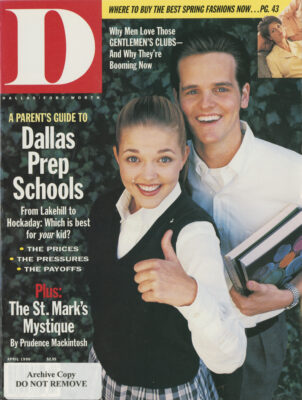When Dallas City Councilwoman Charlotte Mayes recently decided to file suit in federal court against The Dallas Morning News, WFAA-TV Channel 8, and KXAS-TV Channel 5, she immediately set out “to find the best lawyer available.” Her choice-Tulsa-based attorney Gary Richardson-must have caused gnashing of teeth inside the A.H. Belo Corporation, which owns The News and Channel 8.
Councilwoman Mayes contends that the media organi2ations violated federal wiretapping statutes, invaded her privacy, and inflicted emotional distress on her and her family when they released controversial portions of an illegally recorded telephone conversation between Mayes and her brother last November. During the talk, Mayes used racial slurs and belittled her political opponents.
Richardson and Mayes aren’t yet revealing the amount of damages they will seek, but looking at the lawyer’s track record, expect whopping numbers. Ten times in recent years, Richardson has represented plaintiffs against Belo-owned subsidiaries.
In 1991, Richardson represented then-McLennan Count)’ District Attorney Vic Feazell in a suit against WFAA-TV which resulted in the largest libel verdict in U.S. history: $58 million. (The undisclosed settlement ultimately agreed upon, insiders say, ranged from $15 to $30 million.) Belo and WFAA also settled out of court with two other Richardson plaintiffs who had sued over the same series of broadcasts. A year later Richardson won a S4 million verdict at the expense of Belo-owned KOTV-TV in Tulsa. And several other Richardson-filed suits against Belo subsidiaries continue to wind their way through the court system.
Richardson says he’s confident about the Mayes case, but some experts question his chances of winning this one. Neil Cogan, former SMU law professor and current dean of Quinnipiac College School of Law in Hamden, Conn., says that the journalists being sued by Mayes are in a strong First Amendment position. “Support for their defense will, I’m sure, rest in the fact they’ve reported that which is true and that the subject of their reports [Mayes] is a public figure,” he says.
Don Tomlinson, a Texas A&M media and ethics professor, says that the key legal questions will revolve around the media’s decisions to disseminate excerpts from the conversations even after being warned that they were illegally obtained. As precedent, Tomlinson points to the 1971 case of Dietemaann vs. Time, Inc. as being similar to the Mayes case. In it, a California doctor successfully sued Life magazine after it published a story based on information gained by reporters who posed as patients and conspired with law enforcement officials to record conversations in the doctor’s home.
Related Articles

Hot Properties
Hot Property: An Architectural Gem You’ve Probably Driven By But Didn’t Know Was There
It's hidden in plain sight.
By Jessica Otte

Local News
Wherein We Ask: WTF Is Going on With DCAD’s Property Valuations?
Property tax valuations have increased by hundreds of thousands for some Dallas homeowners, providing quite a shock. What's up with that?

Commercial Real Estate
Former Mayor Tom Leppert: Let’s Get Back on Track, Dallas
The city has an opportunity to lead the charge in becoming a more connected and efficient America, writes the former public official and construction company CEO.
By Tom Leppert


